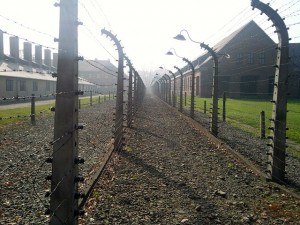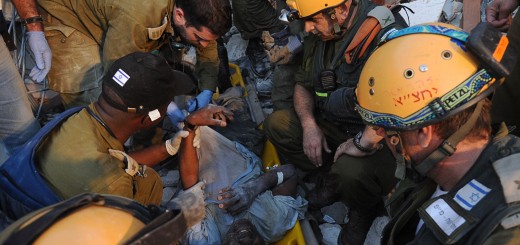International Holocaust Remembrance Day

Even the days associated with the Shoah have become nightmares. In recent times, Jews have been uninvited from Holocaust remembrance ceremonies, in deference to Muslim requests. Anti-Semitic acts have skyrocketed in Europe, and a majority of French Jews have considered making the move to Israel. Angela Merkel concedes that Muslim immigrants from countries saturated with anti-Israel and anti-Jewish sentiment have introduced a new dimension to anti-Semitism in Germany. Ironically, Russia seems to be the safest place for European Jews. As my colleague, Rabbi Abraham Cooper put it in an article in the LA Jewish Journal, as the UN remembers six million dead Jews who were murdered in the Holocaust, its Secretary-General endangers the lives of six million live ones.
To help us remember how we should be reflecting on Churban Europe, we offer some thoughts by R. Shmuel Landesman, a recent guest contributor to this site. They are a foil to what has happened elsewhere on International Holocaust Remembrance Day, January 27th
The Nazis and their collaborators destroyed the mainland European Jewish Communities in a
brutal, cruel and rapid fashion. Having been born over two decades after the end of World
War II, I was obviously not an Eyewitness to History. However, I have been an Eyewitness
to the Eyewitnesses. Please let me share some of what I saw and heard from them.
My bais midrash rebbi, Rav Abba Bronspiegel (may Hashem Grant him a refuah shleimah),
lived for nine months in the rafters of a women’s concentration camp at the age of 5. He has
no idea how he survived and wasn’t caught or didn’t die of starvation/malnutrition. He says it
was a Nes Galui (Revealed Miracle). There’s no other logical explanation. I’ve heard Rav
Bronspeigel speak publicly about what he went through. When an audience member
suggested the Holocaust happened due to the decline in religious observance, Rav
Bronspiegel interrupted him and said, “I came from the Gerrer Chasidim in Poland. You
cannot get frummer than the Gerrer Chasidim of Poland. No Kehilla has yet replicated the
Gerrer Chasidim of Poland.”
My rebbi says he doesn’t judge Holocaust survivors who did not stay frum. “It was easy for
me to stay frum because both my parents survived, which was very unusual. However, most
survivors were orphaned young people and in 1945 in Poland there was an overwhelming sense
of Leis din v’leis Dayan (There’s no Judgment and no Judge.) You cannot imagine the despair
Yidden in Poland felt after the War.”
My rebbi also pointed out that unlike for Spain in 1492; the Chachamim of the generation
did not put a Cheirem against going to Germany. That’s because in the mid and late 1940’s,
Poland was not safe. [The Poles murdered over 2000 Jews between 1945 -1947.] The safest
place for Polish Yidden was the American military zone in Germany, which is where his family
escaped to. By the time all the Yidden left Germany in the 1950’s it was too late to make a
cheirem.”
Around 25 years ago, I met an older woman from the Bronx. She asked me if I heard of the
Alexander Rebbe. [Alexander was one of the largest Chasidic groups in Europe, with 100,
000 Chasidim. Basically, none survived.] I told her I did.
“I came from Alexander Chasidim. My older sister was married to the bechor of the Rebbe,
meaning, she would be the next Alexander Rebbitzen. As you can imagine, I was engaged to
the best bachur in the Alexander Yeshiva. Then came Hitler. Everyone was killed – my
choson, my family, the Rebbe’s family. Everyone. But, even worse. They experimented on me
because I was a twin. The German doctor injected me with Lupus. I got so sick. Suddenly,
the War ended. I spent a year in an American military hospital. The Lupus prevented me
from getting married after the War. I remain too sick to be married.”
(We were both crying.)
“Please tell me. What Aveirah could I have possibly done to deserve this fate in life”?
(I trembled.)
I still tremble over that question.
My aunt’s mother, Mrs Judit Gottdiener a”h, then a teenager, spent six months in Bergen
Belsen. Her relatives told her to eat whatever food she could get her hands on regardless
of Kashrus. Yet, while she ate the soup at night, she always gave the treif piece of meat
away to another prisoner. I asked her why, since she was halachically allowed to eat the
treif meat.
“I didn’t think I’d get out of Bergen Belsen alive, so I wanted to die without having defiled
my body with treif meat.”
My aunt’s father, Mr Boruch Gottdiener z”l, spent several years enslaved in a Hungarian
Nazi labor camp. The punishment for putting on tefilin was to be beaten unconscious the
first time and murdered the second time. Mr Gottdiener never missed a day of laying
tefillin. I also asked him why since we are not obligated to risk our lives to lay tefillin.
“I didn’t think I’d survive the War. So, I didn’t want the Nazis to have the victory of
preventing me from laying tefilin”.
While I have had the privilege of knowing such special Yidden, my children, unfortunately,
have not had the same privilege. Their Yiddishkeit is much poorer for it.



It is easy , especially for Europeans, whose countries aided and abetted the perpetrators of the Holocaust, Yimach Shmam vZicram to have a selective memory and historical amnesia and “mourn” dead Jews while denying the rights of self defense and national existence of Jews living in the State of Israel. If Orthodoxy has grown as an address for Jewish continuity, one can make a strong argument that the roles of Holocaust survivors and BTs, who acted in a countercultural way against the secularizing trends within the US , have had a huge role in that growth.
http://www.wsj.com/articles/for-these-german-vacationers-kids-are-verboten-1454288459 If the members profiled are typical and ordinary people on vacation, could it not be contended that a society that has such little regard for the family unit and children actually has learned very little from the odious conduct perpetrated by its parents and grandparents as participants in the Holocaust?